Varieties and selection of jigs for drilling holes
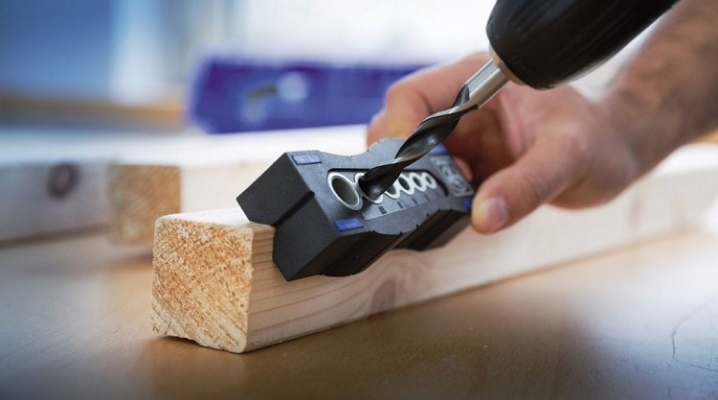
Hole drilling jigs are essential accessories when working with hand and power drills. They come in different types and models: for perpendicular and vertical installation, for chipboard, chipboard, and other materials. The main purpose of the jig is to maintain the specified drilling angle at the entire immersion depth of the tip, increase the accuracy when creating holes in the surface.



What it is?
A jig for drilling holes is a metal bar or bar with guides made in the vertical and horizontal planes. This device is necessary for those who often work with a drill, need error-free positioning of the part of the tool that is in direct contact with the material. Conductors act as templates with which drilling is performed. Depending on how the holes in the fixture are located, options are distinguished for creating cavities at a right angle and acute-angled or obtuse-angled joints.
The design of the product contains a support element located directly on the surface of the material. Depending on what kind of fasteners and type of drills are to be used, all-metal or plastic lightweight strips with plug-in bushings are used. On the body of the jig there may be a mark indicating the diameter of the hole. This tool is versatile, it is used not only when performing small household tasks. Conductors are actively used in the field of mechanical engineering, construction and finishing of buildings, in furniture production.
For industrial purposes, reinforced all-metal strips are produced that can withstand the most intensive use.
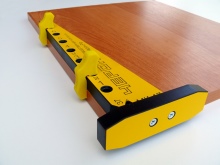


Species overview
The modern industry produces a wide range of jigs: self-centering for precision drilling, for corner joints at 90 degrees, for creating end holes. For vertical or perpendicular drilling, strips with different diameters of inner sleeves are suitable. The oblique or rectangular joinery is well suited for woodworking or woodworking.
By appointment
According to the field of application, it is customary to categorize all conductors. For example, furniture or overhead options are suitable for chipboard, chipboard, boards, and other flat sheet materials. Separately, models are made for dowels - for drilling holes in the end face for protruding fastening elements, for a confirmation screw. For round pipes and cylindrical blanks, rotary or universal options are used - they exclude the shift of the drill during operation. For sheet metal, flat workpieces, when attaching an aluminum profile, you can use a universal version or a special one for self-tapping screws.
When forming holes in tiles, porcelain stoneware, it is customary to use crowns - special drills. When working with them, it is better to immediately purchase a kit with a suitable conductor, so as not to experience difficulties with selection.


Diamond bits and drills are in demand when working with other hard materials: concrete, stone. Usually they are equipped with a water supply device to prevent overheating.
Installation of frames and socket boxes requires the use of additional devices. Most often these are simple patterns made of plexiglass or plywood, boards. They help to keep its contents inside the hole when sculpting and pouring mortar, mounting sheets, without losing the given geometry. By analogy, such elements are called conductors, although they do not participate in the drilling process. Usually they are used if you need to install 3-5 socket outlets in a row.

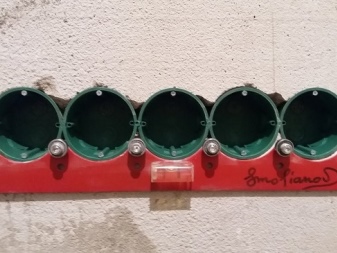
By design
The type of construction of the conductor largely determines its functionality. Among the types used by masters in different fields of activity, four of the most popular options can be distinguished.
- Overhead. The jig in the process of work is in contact with a flat face with the surface of the material being drilled, pressed with clamps or hands. This variety is focused on work on the plane, it is often also called furniture. The best choice of a surface-mounted jig is when working with chipboard, MDF and other wood-based panels.

- Swivel. This type of templates is optimal for use on surfaces of spherical, hemispherical, cylindrical shapes. The rotary design allows for correct positioning of the instruments. The bushings help guide the drilling line and the template adheres to the surface horizontally, vertically, and on an incline.

- Universal purpose. They are focused on industrial production in small volumes, making it easy to adjust the template to different types of surfaces.

- Tilting. Similar to the universal options, they are easy to use when creating holes in different planes or with a varying slope. According to the method of application to the surface, there are fixed and sliding conductors. The first are equipped with stationary clamps. They can be installed on horizontal and vertical surfaces. The latter do not imply rigid fixation, they require constant hand holding. Because of these features, they are rarely used in work outside of everyday life.
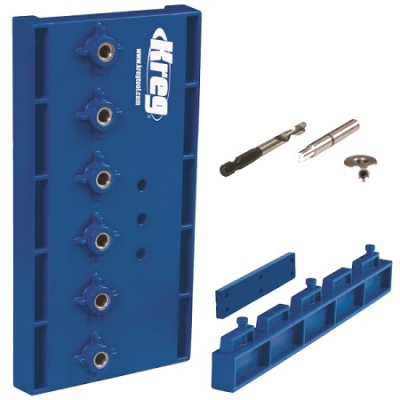
Popular models
- Kwb Dubleprofi. The professional model from the Czech manufacturer has a design with a stop bar, a wide range of templates. The jig is designed for fastening to flat materials with a horizontal surface. The package includes a depth gauge, templates are resistant to grinding.

- Kreg. The company has a Jig Mini model for drilling holes for self-tapping screws (for 1 diameter). The assortment also includes conductors with different sizes of bushings, options for confirmation. You can even find a portable drilling base for the brand, the product has only one drawback - a plastic case.

- "Practice 247-026". Inexpensive plastic jig in the form of a circle with holes located along its axes. Dust and shavings are collected with a special rubber rim. The product is quite convenient to use, increases the accuracy of the craftsman's work, but is short-lived and wears out quickly.

- "Bison 29853". A jig with a suction cup with a comfortable handle and 7 hole diameters. Designed to work with tubular diamond drills, allows the use of water cooling when drilling. This is a good option for tiles, porcelain stoneware, and other tile materials for decoration.

- Bosch 2607000549. Conductor for creating holes for dowels. The templates are designed to work with the most common diameters, the model is considered universal, it can be used for working on wood and metal. The plastic case is not very durable, but it is made with high quality.
These are the most popular models and brands of conductors. You can find other, less common and popular options on sale.

Selection rules
When choosing a suitable jig option, it is important to pay attention to a number of important parameters. Among the most significant points is the type of material.The most inexpensive devices are always plastic, but they are subject to rapid wear and tear, easily break and damage. All-metal options are heavy, bulky, almost eternal. They are difficult to damage, but they cannot be called mobile either. A compromise is most often the choice of a jig with a plastic body and steel sleeves.
It is also necessary to pay attention to other equally important criteria.
- Construction type. It is determined based on the type of work. For example, when assembling furniture, both sliding and overhead conductors are in demand. When working with metal, it is better to take universal models.
- Mounting type. Clamps are usually used on the horizontal plane. Bulky products and materials require the use of a suction cup. It is most often used on vertical walls when drilling holes during construction and repair.
- Specialization. Many types of conductors have a narrow application. So, there are options that allow you to create holes for the confirmation, to make them in different planes. When choosing a device, this factor should also be taken into account, otherwise it will be useless.
- Manufacturing company. The choice of a brand is also important, since it affects the quality, cost, and reliability of the conductor. It is best to trust firms specializing in the production of such accessories. These are the Russian "Praktika", the German concern BOSCH, the Kreg company. It is definitely not worth ordering precision marking tools from Chinese online stores.


Among the important rules, one can also mention the correspondence of the diameters of the working bushings or templates available in the jig, the sizes of fasteners and drills for working in wood, metal, concrete.
For home use, it is better to immediately purchase a universal version with several available standard sizes - this will allow you not to buy a new accessory every time to improve drilling accuracy.


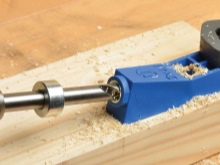
How to use?
It is not enough to choose the right conductor - they still need to learn how to use it correctly. Not all ready-made devices conveniently implement a fastening or stop system; often you have to adjust the tool for yourself or endure inconvenience. The easiest to use are overhead conductors: they are quite simple to place on top of the main material and leave to lie free or press down by hand, clamp, bolt. When making a hole, the marker is displaced or removed. In the furniture industry, conductors are used, which are more similar to square rulers, but with holes of different diameters drilled in them. The design can be sliding - laid on, without additional fasteners. It is applied to the markings, positioned, aligned with the drill and a hole is made to the desired depth.
On the surface of tiles and other slippery surfaces, conductors with a suction cup are used. In this case, the surface of the rubber retainer is moistened with soapy water or other liquid, then fixed in the specified area. For large sizes and heavy loads, special clamps are used. It is important to accurately position the material on the surface so that the template allows the hole to be drilled at the desired angle.
A big advantage in this case is the absence of the need for preliminary marking with a core.


In the next video, you will find an overview of the KWB DÜBELPROFI drilling jig.













The comment was sent successfully.